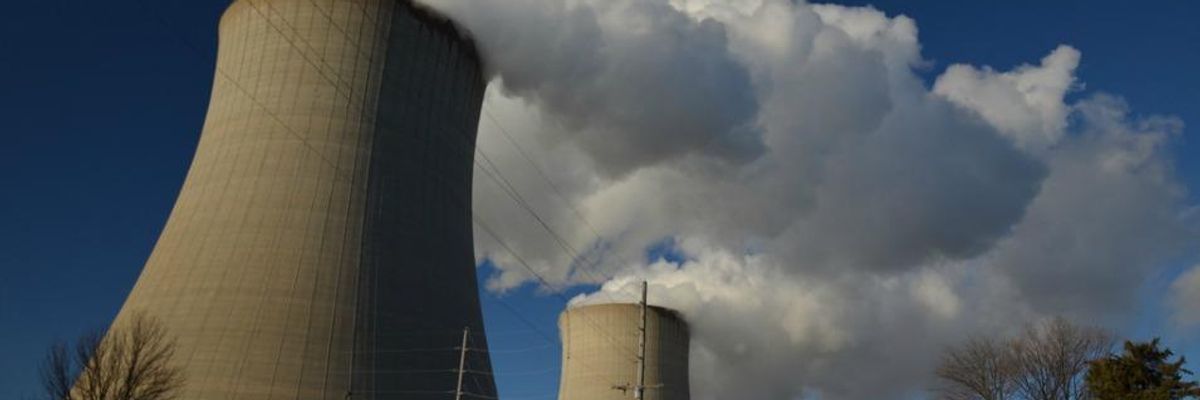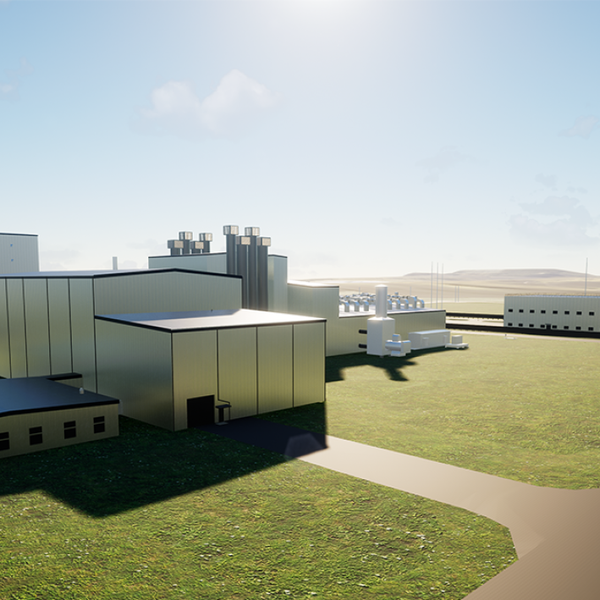
Analysis Warns Climate Crisis Threatens US Nuclear Reactors
"Climate change is expected to exacerbate natural hazards—including heat, drought, wildfires, flooding, hurricanes, and sea level rise," the report reads.
The nation's nuclear reactors may be at risk due to the climate emergency, according to a report released by the U.S. Government Accountability Office on Tuesday.
The report claims the Nuclear Regulatory Commission (NRC) needs to consider these risks as it regulates nuclear power plants going forward. There are currently 94 nuclear reactors in the United States that could be affected.
"Climate change is expected to exacerbate natural hazards—including heat, drought, wildfires, flooding, hurricanes, and sea-level rise. In addition, climate change may affect extreme cold weather events," the report reads. "Risks to nuclear power plants from these hazards include loss of offsite power, damage to systems and equipment, and diminished cooling capacity, potentially resulting in reduced operations or plant shutdowns."
Extreme weather event like floods can pose safety risks to #NuclearPower plants. #ClimateChange is likely to make these natural hazards more severe.
Our new report looks at how @NRCgov could better address climate risks to nuclear power plants: https://t.co/lZhGAjtNkF pic.twitter.com/MOjambENtG
— U.S. GAO (@USGAO) April 2, 2024
The report notes that many new reactors are currently being developed, which increases the need for the NRC to properly regulate those reactors.
It says that the NRC has mostly used historical data to "identify and assess safety risks," which would not account for the climate risks that are likely to threaten reactors in the future. The report claims most reactors could be negatively impacted by future climate risks.
Beyond Nuclear, which advocates against nuclear power and weapons, said in a statement that that GAO's findings and recommendations confirm what the group has been litigating with the NRC—that "the agency cannot continue to ignore the safety impacts on nuclear power plants from the worsening climate crisis."
"These risks include a worsening of natural hazards and encompass heat and cold, drought, wildfires, flooding, hurricanes, and sea-level rise, according to the GAO, all of which could seriously jeopardize the safe operation of the nation's current fleet that is going through extreme license renewals—and any future new... nuclear reactors if not properly safeguarded," the group said.
Plans to triple the amount of nuclear power in 22 countries by 2050 that were announced at the most recent United Nations climate summit have been denounced as "dangerous" and not a realistic solution to address the climate emergency.
An Urgent Message From Our Co-Founder
Dear Common Dreams reader, The U.S. is on a fast track to authoritarianism like nothing I've ever seen. Meanwhile, corporate news outlets are utterly capitulating to Trump, twisting their coverage to avoid drawing his ire while lining up to stuff cash in his pockets. That's why I believe that Common Dreams is doing the best and most consequential reporting that we've ever done. Our small but mighty team is a progressive reporting powerhouse, covering the news every day that the corporate media never will. Our mission has always been simple: To inform. To inspire. And to ignite change for the common good. Now here's the key piece that I want all our readers to understand: None of this would be possible without your financial support. That's not just some fundraising cliche. It's the absolute and literal truth. We don't accept corporate advertising and never will. We don't have a paywall because we don't think people should be blocked from critical news based on their ability to pay. Everything we do is funded by the donations of readers like you. Will you donate now to help power the nonprofit, independent reporting of Common Dreams? Thank you for being a vital member of our community. Together, we can keep independent journalism alive when it’s needed most. - Craig Brown, Co-founder |
The nation's nuclear reactors may be at risk due to the climate emergency, according to a report released by the U.S. Government Accountability Office on Tuesday.
The report claims the Nuclear Regulatory Commission (NRC) needs to consider these risks as it regulates nuclear power plants going forward. There are currently 94 nuclear reactors in the United States that could be affected.
"Climate change is expected to exacerbate natural hazards—including heat, drought, wildfires, flooding, hurricanes, and sea-level rise. In addition, climate change may affect extreme cold weather events," the report reads. "Risks to nuclear power plants from these hazards include loss of offsite power, damage to systems and equipment, and diminished cooling capacity, potentially resulting in reduced operations or plant shutdowns."
Extreme weather event like floods can pose safety risks to #NuclearPower plants. #ClimateChange is likely to make these natural hazards more severe.
Our new report looks at how @NRCgov could better address climate risks to nuclear power plants: https://t.co/lZhGAjtNkF pic.twitter.com/MOjambENtG
— U.S. GAO (@USGAO) April 2, 2024
The report notes that many new reactors are currently being developed, which increases the need for the NRC to properly regulate those reactors.
It says that the NRC has mostly used historical data to "identify and assess safety risks," which would not account for the climate risks that are likely to threaten reactors in the future. The report claims most reactors could be negatively impacted by future climate risks.
Beyond Nuclear, which advocates against nuclear power and weapons, said in a statement that that GAO's findings and recommendations confirm what the group has been litigating with the NRC—that "the agency cannot continue to ignore the safety impacts on nuclear power plants from the worsening climate crisis."
"These risks include a worsening of natural hazards and encompass heat and cold, drought, wildfires, flooding, hurricanes, and sea-level rise, according to the GAO, all of which could seriously jeopardize the safe operation of the nation's current fleet that is going through extreme license renewals—and any future new... nuclear reactors if not properly safeguarded," the group said.
Plans to triple the amount of nuclear power in 22 countries by 2050 that were announced at the most recent United Nations climate summit have been denounced as "dangerous" and not a realistic solution to address the climate emergency.
The nation's nuclear reactors may be at risk due to the climate emergency, according to a report released by the U.S. Government Accountability Office on Tuesday.
The report claims the Nuclear Regulatory Commission (NRC) needs to consider these risks as it regulates nuclear power plants going forward. There are currently 94 nuclear reactors in the United States that could be affected.
"Climate change is expected to exacerbate natural hazards—including heat, drought, wildfires, flooding, hurricanes, and sea-level rise. In addition, climate change may affect extreme cold weather events," the report reads. "Risks to nuclear power plants from these hazards include loss of offsite power, damage to systems and equipment, and diminished cooling capacity, potentially resulting in reduced operations or plant shutdowns."
Extreme weather event like floods can pose safety risks to #NuclearPower plants. #ClimateChange is likely to make these natural hazards more severe.
Our new report looks at how @NRCgov could better address climate risks to nuclear power plants: https://t.co/lZhGAjtNkF pic.twitter.com/MOjambENtG
— U.S. GAO (@USGAO) April 2, 2024
The report notes that many new reactors are currently being developed, which increases the need for the NRC to properly regulate those reactors.
It says that the NRC has mostly used historical data to "identify and assess safety risks," which would not account for the climate risks that are likely to threaten reactors in the future. The report claims most reactors could be negatively impacted by future climate risks.
Beyond Nuclear, which advocates against nuclear power and weapons, said in a statement that that GAO's findings and recommendations confirm what the group has been litigating with the NRC—that "the agency cannot continue to ignore the safety impacts on nuclear power plants from the worsening climate crisis."
"These risks include a worsening of natural hazards and encompass heat and cold, drought, wildfires, flooding, hurricanes, and sea-level rise, according to the GAO, all of which could seriously jeopardize the safe operation of the nation's current fleet that is going through extreme license renewals—and any future new... nuclear reactors if not properly safeguarded," the group said.
Plans to triple the amount of nuclear power in 22 countries by 2050 that were announced at the most recent United Nations climate summit have been denounced as "dangerous" and not a realistic solution to address the climate emergency.

